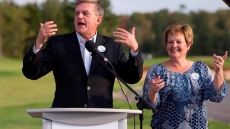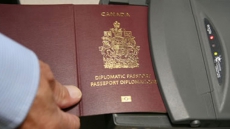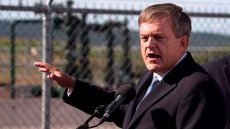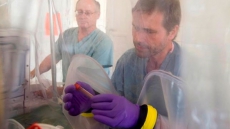VANCOUVER - A litany of consequences arise if the British Columbia government is allowed to get away with rubbing out hundreds of clauses from the teachers' union's collective agreement, warns a lawyer for the B.C. Teachers' Federation.
John Rogers told a B.C. Appeal Court panel on Wednesday that the province believes an impasse in collective bargaining justifies using legislation to get a settlement, as long as it first engages the union in a policy discussion.
He was attacking the position laid out by government a day earlier, where a lawyer for the province argued that consultations with the teachers' federation are enough to uphold educators' charter rights.
"That means, of course, that collective agreements can be eliminated at will. It's not just a hypothetical. We have this case, of course, where hundreds of clauses were deleted ...," Rogers told the panel.
The lawyer listed off more than 14 contract items that could be targeted or eliminated, citing evidence from former education ministry officials: compensation, professional development, seniority rights, sick leave and benefits, amongst them.
These aren't matters to be bargained. These are matters to be imposed, Rogers said.
"And if government is right, this is what it can do as long as it has some consultation."
The parties are in court asking the five-judge panel to untangle the conflict over educational policy. The province is appealing a ruling decided in favour of the union last January, when B.C. Supreme Court Justice Susan Griffin judge found the government violated teachers' constitutional rights to negotiate issues around class size and composition.

The BCTF repeatedly pointed to the recent court victory — and a near duplicate prior victory in 2011 — during their recent strike, saying the rulings showed the government couldn't be trusted to bargain in good faith.
A lawyer for the province argued on Tuesday that the B.C. Liberals deleted the clauses from the teachers' contract in 2002 in order to break 20 years of conflict around contract negotiations. Karen Horsman said the government introduced Bill 28 in order to work around the impasse, and introduced a special "class organization fund" as a substitute for the erased provisions around working conditions.
But Rogers said Wednesday that claim was unsupportable, pointing to evidence from the earlier trials. He said the union was willing to discuss substantive issues — and not simply asking for more funding in their contract — but that was ignored.
He cited the finding that the government's bargaining agent already knew hundreds of clauses would be removed, and so had zero motivation itself to compromise.
"So it's not an impasse on collective bargaining," Rogers said. "It's (that) the government has determined ... it was going to eliminate the right to engage collective bargaining on fundamental important workplace issues."
He further argued the Supreme Court of Canada has previously ruled that the charter right at stake protects labour unions' right to engage in collective bargaining, "not the right to consult with government."
The lower court judge gave the government one year to come up with a fix after ruling against it in April 2011. She also restored the deleted provisions. The province did not appeal. But in March 2012, it passed back-to-work legislation when teachers walked off the job for three days with Bill 22, which again erased the clauses.
The union and its employer negotiated a six-year contract last month, but the agreement left a gap to be filled by the court decision, which is anticipated to be appealed to the Supreme Court of Canada.





